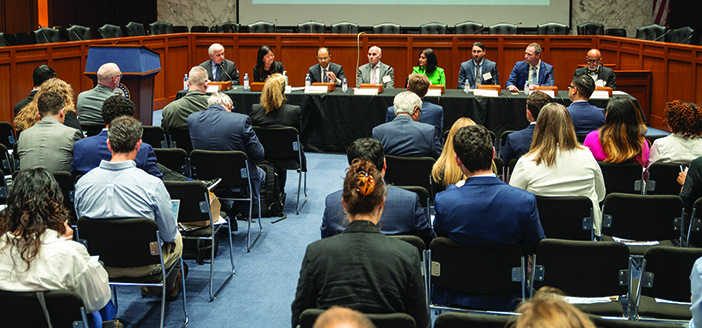In the nation’s capital, RNA experts call for a counterpart to Human Genome Project—and for the US to lead the way.
On May 8, a panel of esteemed RNA experts—including a Nobel Prize winner—gathered in Washington, DC, to explain the incredible potential of RNA technology and urge decision-makers to support its development.
The congressional briefing, cosponsored by the Medical School and The Warren Alpert Foundation and hosted by Sen. Jack Reed (D-RI), drew scientists, academics, the private sector, and Capitol Hill staff, who learned how RNA could transform health care, agriculture, data storage, and national security—and applauded the panelists’ call for funding and education to advance RNA science.
“We are on the verge … of a new frontier, and we have to be the leaders in that frontier,” Reed said in his introductory remarks. “As a nation, it is essential we maintain our global leadership to harness this tool for good.”
The speakers included Drew Weissman, MD, PhD, a co-recipient of the 2023 Nobel Prize in Physiology or Medicine for discoveries that enabled the mRNA vaccines against COVID-19. He highlighted the many other diseases and conditions such vaccines may someday treat, from the flu to cancer to allergies, as well as RNA’s potential to make gene therapy more accessible and heart disease treatment less invasive. Olgica Milenkovic, PhD, a professor of electrical and computer engineering at the University of Illinois, described how RNA and DNA could replace space- and energy-hogging server farms to store the world’s data.
“All of the data we have on the planet right now—all of it could fit in the DNA or RNA” of a single person, Milenkovic said. Each nucleotide can store about two bits, she added; RNA, with its many modifications, has greater, and denser, storage capacity than DNA.
University of Pennsylvania Professor of Biology Brian Gregory, PhD, said RNA can be harnessed as “medicines” so crops can respond to stressors like climate change and pathogens, and even improve crop quality. Gregory and Ryan Morhard, JD, of Ginkgo Bioworks, stressed emerging global competition in biotechnology as another key reason for US investment. “We’re already way behind in [RNA] technology,” Gregory said. Morhard added that RNA infrastructure developed by an adversarial nation such as China—which is already outspending the US in RNA research and technology development—could be a national security risk.
“Where things are made and how they’re made really matters,” Morhard said. “It’s really important in a biorevolution that we have biosecurity in the same way that the digital revolution had cybersecurity.”
In a Q&A with Frederick Tyson, PhD, of the National Institute of Environmental Health Sciences, each panelist stressed the need for funding to develop the technology and infrastructure necessary to achieve RNA’s full potential. RNA biologist Vivian Cheung, MD, called for public-private partnerships and support for interdisciplinary education of future generations of RNA scientists, and asked the audience to “think before you walk out of those doors what you can do to solve this problem.” Cheung added, “We need to work together.”
Dean Mukesh K. Jain, MD, wrapped up the briefing by echoing Cheung’s call to action: “It’s really important to coalesce in an urgent fashion around something that is really, really important, and maintain what the US has done for many, many years—maintain its leadership in research and innovation.”




